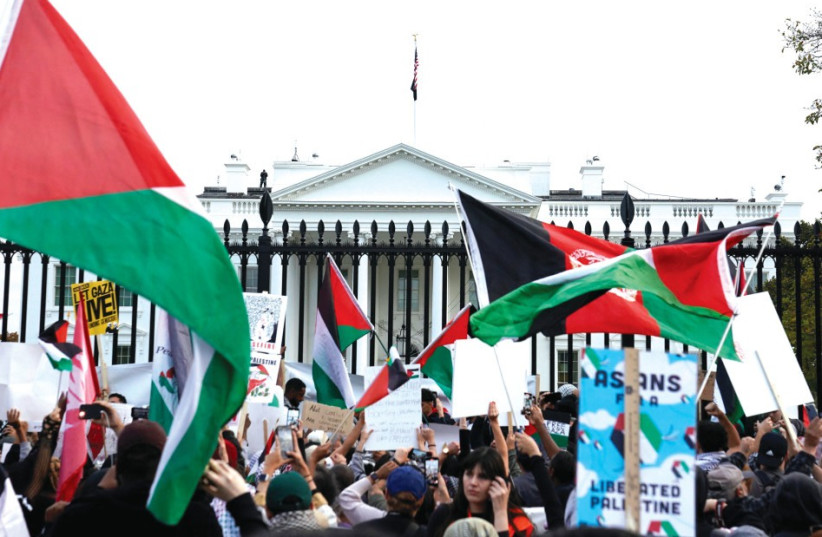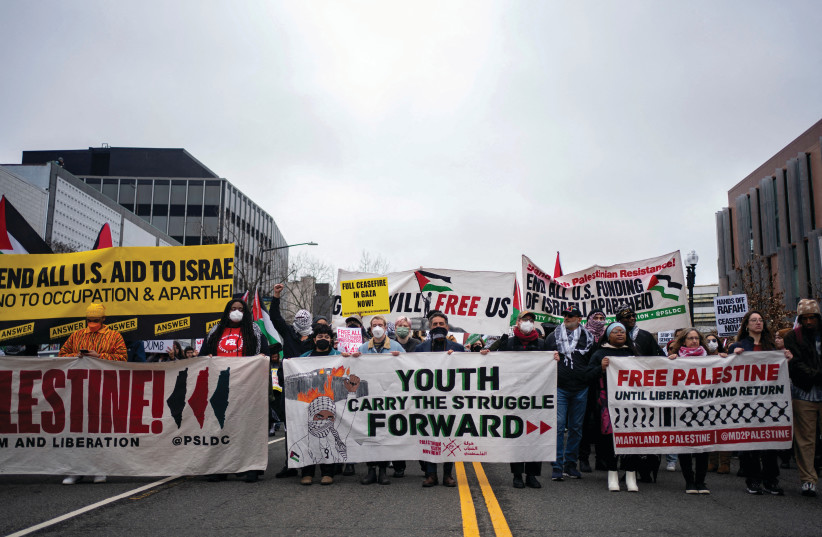It’s everything a journalist must salute, a humanist must confront, and a Jew must dread.
Carrying the loaded title “The Golden Age of American Jews is Ending,” an Atlantic magazine cover essay by Franklin Foer maps the rise, reach, roots, and impact of America’s new antisemitism before reaching the harsh conclusion that its title announces and its narrative decries.
The journalistic feat is that this work, for which Foer traveled from coast to coast debriefing victims of America’s new antisemitism, epitomizes the purpose of journalism, which is to write history’s first draft. What an ordinary news story does to a single event, this essay does to an epoch that lasted 80 years, involved millions, and, if Foer is right, has just ended unannounced.
Author of the critically acclaimed World Without Mind: The Existential Threat of Big Tech (2017), Foer looks sideways, backward, and forward as he overflies the cleavage between an unfolding era of menace and a departing era of optimism, prominence, achievement, and respect.
Looking sideways, Foer visits verbal, social, and violent incidents in schools, universities, city councils, and varied public spaces in which he detects an anti-Jewish pincer movement led by ultra-progressives on the Left and old-school racists on the Right.

On the Right, he shows, for instance, a study indicating that millions of Americans blame “the Jews” for the 2008 financial meltdown. On the Left, he finds “a disconcerting number of Israel’s critics” denying the Jews’ “right to a nation of their own.”
These are the attitudes flanking 56 physical attacks on Jews and 554 acts of vandalism on Jewish locations recorded by the Anti-Defamation League during the three months following the October 7 Massacre alone, besides 1,307 public events with anti-Semitic rhetoric and another 1,347 incidents of harassment, oral or written.
Alongside such open hostility, there is also a transforming social landscape, underpinned by “a deliberate institutional drive to re-engineer the elite” in a way that effectively sidelines the Jews, for instance, in admissions policies to Ivy League schools.
It’s a stark contrast with what Foer collects when looking backward: the postwar America that canceled anti-Jewish discrimination and embraced an astonishing battery of unabashedly Jewish celebrities, from Jerry Seinfeld, Woody Allen, and Barbara Streisand to Joe Lieberman, Ruth Westheimer, and Eli Wiesel.
The golden age of American Jewry was not just an era of Jewish legitimacy and excellence, underscored by the mind-boggling fact that American Jewry supplied 15 percent of all Nobel Laureates. It was an era defined by moral ideals and political norms that Jewish heritage inspired, Jewish thinkers articulated, and the Jewish masses embraced – ideas and norms that comprised “a distinct strain of liberalism that combined robust civil liberties, the protection of minority rights, and an ethos of cultural pluralism.”
Now this liberalism has been shed by “a society that has lost its capacity to express disagreements without resorting to animus,” a doubly alarming insight considering that Foer is a grandchild of Holocaust survivors. Hence also the potency of the analogy he draws between America’s Jews today and Germany’s during the Weimar Republic.
Looking forward, Foer warns that “the forces arraigned against Jews, on the Right and the Left, are far more powerful than they were 50 years ago,” and worse: “The surge in antisemitism is a symptom of the decay of democratic habits,” a decadence that is “a leading indicator of rising authoritarianism.”
This, in brief, is what Foer says in an essay that may be cited in the future as an early detection of a major turning point in the histories of both the American nation and the Jewish people. However, there is a third side to the triangle on which all this is unfolding: Israel. And the question it raises is this: What should the Jewish state do as the Golden Age of American Jewry comes to an end?

THE ISRAELI reflex has long been to see antisemitism’s eruption anywhere as a Zionist vindication and an Israeli opportunity.
The vindication was moral, since Zionist dogma, as articulated in Theodore Herzl’s The Jewish State, argued that Jewish life wouldn’t be safe without a Jewish state. The opportunity was demographic, since antisemitism’s victims would hopefully arrive in Israel and thus make it grow, as they indeed did after the liberation of Soviet and Ethiopian Jewries.
Not how we should respond to America’s antisemitic crisis
Well, that’s not how we should respond to America’s antisemitic crisis.
First, with all due respect to Ilhan Omar, David Duke, Kanye West, and the rest of American antisemitism’s heroes, Jewish life alongside them is still safer than Israeli life in the shadows of Hezbollah, Hamas, and Iran. Moreover, while Foer’s warning is convincing and alarming, America’s illness is not incurable.
Lastly and most importantly, a torn and hateful America is bad not only for American Jews; it’s bad for Western civilization and for the Jewish state.
The cost of a post-democratic, antisemitic America would not be worth the 1 or 2 million new immigrants it might send here. Yes, Israel will have more people, but in what kind of world? A world where bigotry, libel, robbery, and theft sidestep freedom, justice, merit, and every form of fair play?
Israel should therefore help American Jews fight American antisemitism, just like American Jews have fought for Israel since the day it was born.
The Mossad has experience uncovering antisemitism in Europe. It should be shared with the FBI, so the leaders of the anti-Jewish commotion will be exposed along with their motivations and operators. Jewish students, synagogues, and community centers need training in self-defense. We should offer that too. But more than anything else, Israel should inspire American Jews to focus less on what they have been doing – defense – and shift to what they have not been doing – attack.
www.MiddleIsrael.net
The writer, a Hartman Institute fellow, is the author of the bestselling Mitzad Ha’ivelet Ha’yehudi (The Jewish March of Folly, Yediot Sefarim, 2019), a revisionist history of the Jewish people’s political leadership.
